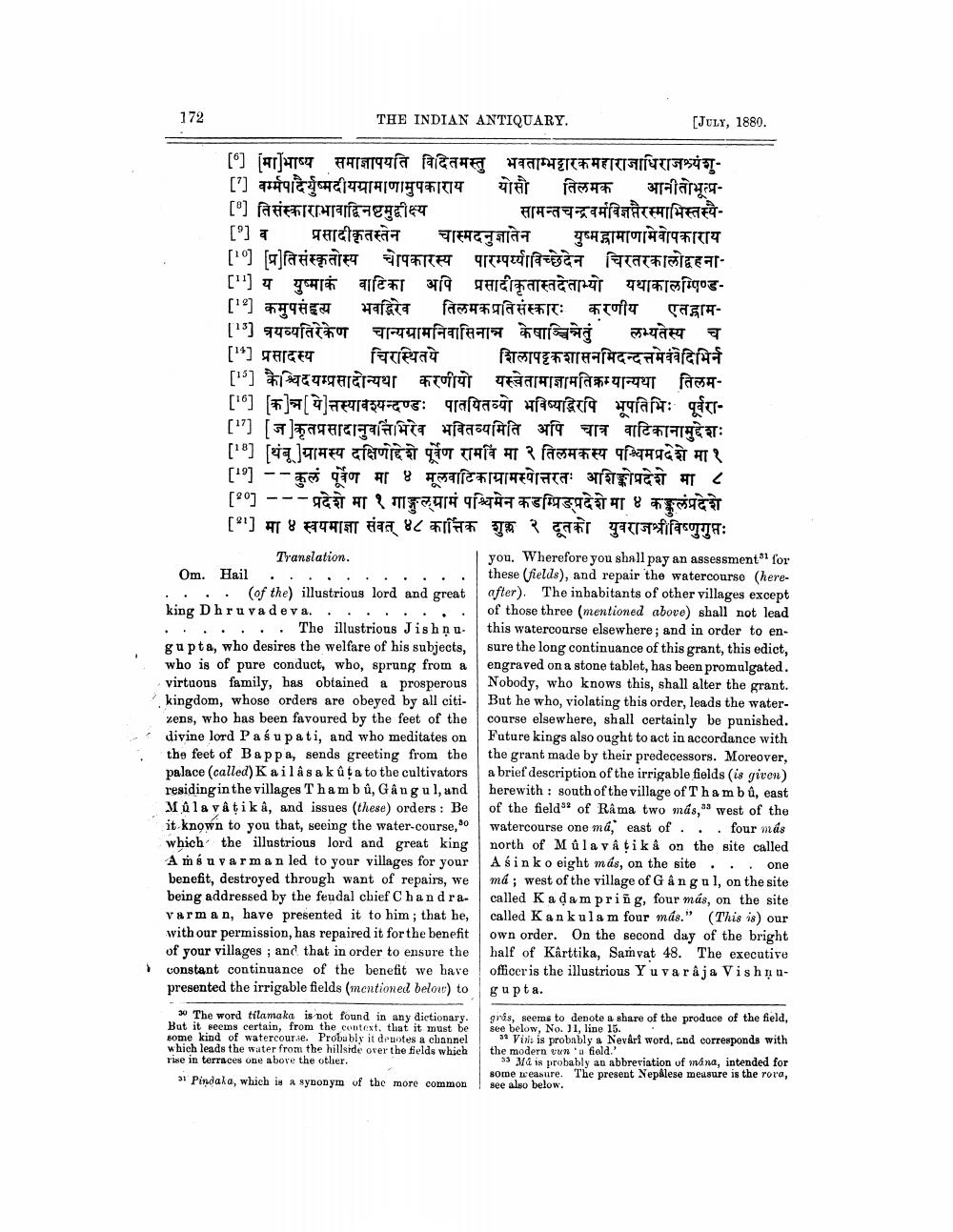________________
172
THE INDIAN ANTIQUARY.
[] [मा]भाग्य समाजापयति विदितमस्तु भवताम्भट्टारकमहाराजाधिराजशु [] प |र्गुष्मदीयमाणामुपकाराय योसो तिलमक
आनीतोभूत्
[] विसंस्काराभावाद्विन मुदीक्ष्य
सामन्तचन्द्रशिरस्माभिस्तस्यै [] व प्रसादीकृतस्तेन चास्पदनुज्ञातेन युष्मद्वामाणामेोपकाराय [1] [प्र ]तिसंस्कृतोस्य चोपकारस्य पारम्पर्ण्यविच्छेदेन चिरतरकालोद्वहना[] व युष्माकं वाटिका अपि प्रसादीकृतास्तदेताभ्यो यथाकालपिण्ड[12] कमुपसंहृत्य भवद्भिरेव तिलमक प्रतिसंस्कारः करणीय एतनामलभ्यतेस्पच
[15] त्रयव्यतिरेकेण चान्यग्रामनिवासिनाम के पा [14] प्रसादस्य चिरस्थितये
शिलापट्टकशासनमिदन्दत्तमेवंवेदिभिर्न
चात्र
[15] केविदयम्पसादोन्यथा करणीयो यस्वेतामातामतिकरयान्यथा तिलम[10] [[ ] [ ये] तस्यावश्यन्दण्डः पातयितव्यो भविष्यद्भिरपि भूपतिभिः पूर्वरा[T] [ज] कृतप्रसादामुनिभिरेव भवितव्यमिति अपि चाप वाटिकानामुद्देशः [18] [थंबू ] ग्रामस्य दक्षिणोद्देशे पूर्वेण रामवि मा २ तिलमकस्य पश्चिमप्रदेशे मा १ [+] - कुलं पूर्वेण मा ४ मूलवाटिकायामयेोत्तरतः अशोपदेशे मा ८ [20] -- प्रदेशे मा १ मा पश्चिमेन कडमिपदेशे मा ४ ककुलप्रदेशे ["] मा ४ स्वयमाज्ञा संवत् ४८ कार्त्तिक शुक्ल २ दूतको युवराजश्री विष्णुगुप्तः
———
Translation.
Om. Hail
(of the) illustrious lord and great king Dhruvadeva. .
..... The illustrious Jishnugupta, who desires the welfare of his subjects, who is of pure conduct, who, sprung from a virtuous family, has obtained a prosperous . kingdom, whose orders are obeyed by all citizens, who has been favoured by the feet of the divine lord Pasupati, and who meditates on the feet of Bappa, sends greeting from the palace (called) Kailasakûta to the cultivators residing in the villages Tham bû, Gângul, and Mólavatika, and issues (these ) orders: Be it known to you that, seeing the water-course, which the illustrious lord and great king Amsuvarman led to your villages for your benefit, destroyed through want of repairs, we being addressed by the feudal chief Chandra. varman, have presented it to him; that he, with our permission, has repaired it for the benefit of your villages; and that in order to ensure the constant continuance of the benefit we have presented the irrigable fields (mentioned below) to
30
30 The word tilamaka is not found in any dictionary. But it seems certain, from the context, that it must be some kind of watercourse. Probably it denotes a channel. which leads the water from the hillside over the fields which rise in terraces one above the other.
31 Pindala, which is a synonym of the more common
[JULY, 1880.
you. Wherefore you shall pay an assessment" for these (fields), and repair the watercourse ( hereafter). The inhabitants of other villages except of those three (mentioned above) shall not lead this watercourse elsewhere; and in order to ensure the long continuance of this grant, this edict, engraved on a stone tablet, has been promulgated. Nobody, who knows this, shall alter the grant. But he who, violating this order, leads the watercourse elsewhere, shall certainly be punished. Future kings also ought to act in accordance with the grant made by their predecessors. Moreover, a brief description of the irrigable fields (is given) herewith: south of the village of T ha m bû, east of the fields of Rama two mäs, as west of the watercourse one má, east of... four más north of Mûla vâtika on the site called Asinko eight más, on the site... one md ; west of the village of Gangul, on the site called Kadampring, four más, on the site called Kankulam four más." (This is) our own order. On the second day of the bright half of Kârttika, Samvat 48. The executive officer is the illustrious Yuvaraja Vishnugupta.
33
grås, seems to denote a share of the produce of the field, see below, No. 11, line 15.
33 Vis is probably a Nevârf word, and corresponds with the modern eun u field.'
33 Ma is probably an abbreviation of mána, intended for some reasure. The present Nepalese measure is the rora, see also below.




